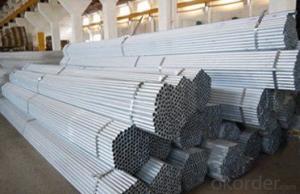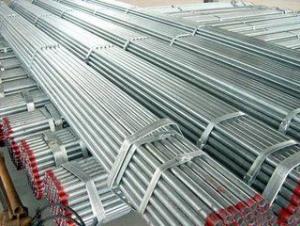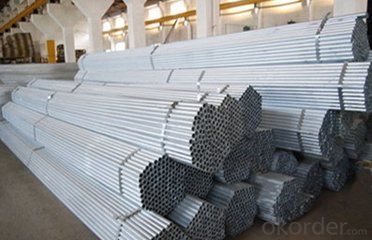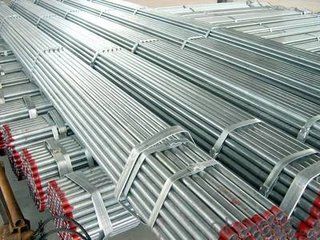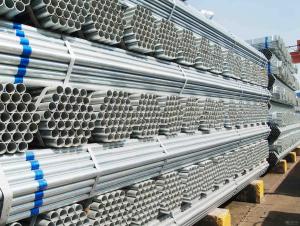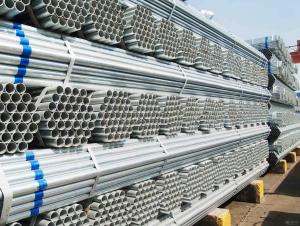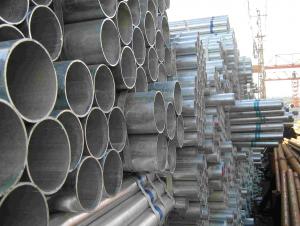Pre-galvanized Pipe America Standard Q235 A500 150g Hot Dipped
- Loading Port:
- Tianjin
- Payment Terms:
- TT or LC
- Min Order Qty:
- 45 m.t.
- Supply Capability:
- 9000 m.t./month
OKorder Service Pledge
OKorder Financial Service
You Might Also Like
1、Structure of Pre-galvanized Pipe America Standard Q235 A500 150g Hot Dipped or Galvanized Pipe:
The surface of Pre-galvanized Pipe America Standard Q235 A500 150g Hot Dipped or Galvanized Pipecan increase the corrosion resistance of the steel tube, prolong service life. Galvanized pipe is widely used, in addition to water, gas, oil and other general low pressure fluid pipelines. It is also used in the petroleum industry, especially for offshore oil field of oil well pipe and oil pipe, chemical, coking equipment of oil heater, condensation cooler, coal run oil exchanger tube, and trestle pile, the mine tunnel support frame tube.
2、Main Features of Pre-galvanized Pipe America Standard Q235 A500 150g Hot Dipped or Galvanized Pipe:
• High manufacturing accuracy with standard
• High strength and stable
• Good visual effect
• Reasonable price
• Small inertia resistance
• Strong heat dissipation ability
3、Pre-galvanized Pipe America Standard Q235 A500 150g Hot Dipped or Galvanized Pipe Specification:
Standard | GB, DIN, ASTM ASTM A106-2006, ASTM A53-2007 |
Grade | 10#-45#, 16Mn 10#, 20#, 45#, 16Mn |
Thickness | 1 - 33 mm |
Section Shape | Round |
Outer Diameter | 21 - 610mm |
Place of Origin | Tianjin, China (Mainland) |
Secondary Or Not | Non-secondary |
Application | Hydraulic Pipe |
Technique | Cold Drawn |
Certification | API |
Surface Treatment | factory state or painted black |
Special Pipe | API Pipe |
Alloy Or Not | Non-alloy |
Length | 5-12M |
Outer Diameter | 21.3-610mm |
Grade | 20#, 45#, Q345, API J55, API K55, API L80, API N80, API P110, A53B |
Standard | ASME, ASTM |
1) Material:20#(ASTM A 106/A53 GRB.API5LGRB,GB),45#,16Mn,10#.
2) Specification range:OD:21.3-610mm,WT:6-70mm,length:6-12m or according to the requirement of clients.
3) Excutive standards:GB,ASME API5L.ASTM A 106/A53,Despite of the above standards,we can also supply seamless steel pipe with standard of DIN,JIS,and so on,and also develop new products according to the requirements of our clients!
4) Surface:black lacquered,varnish coating or galvanized.
5) Ends:Beveled or square cut,plastic capped,painted.
6) Packing:bundles wrapped with strong steel strip,seaworthy packing.
4、Packaging & Delivery
Packaging Details: | seaworthy package,bundles wrapped with strong steel strip |
Delivery Detail: | 15-30days after received 30%TT |
5、FAQ of Pre-galvanized Pipe America Standard Q235 A500 150g Hot Dipped or Galvanized Pipe:
①How is the quality of your products?
Our products are manufactured strictly according to national and internaional standard, and we take a test
on every pipe before delivered out. If you want see our quality certifications and all kinds of testing report, please just ask us for it.
Guaranteed: If products’ quality don’t accord to discription as we give or the promise before you place order, we promise 100% refund.
③Why should you chose us?
Chose happens because of quality, then price, We can give you both.Additionally, we can also offer professional products inquiry, products knowledge train(for agents), smooth goods delivery, exellent customer solution proposals.Our service formula: good quality+good price+good service=customer’s trust
SGS test is available, customer inspection before shipping is welcome, third party inspection is no problem.
6、 Pre-galvanized Pipe America Standard Q235 A500 150g Hot Dipped or Galvanized Pipe: Images:
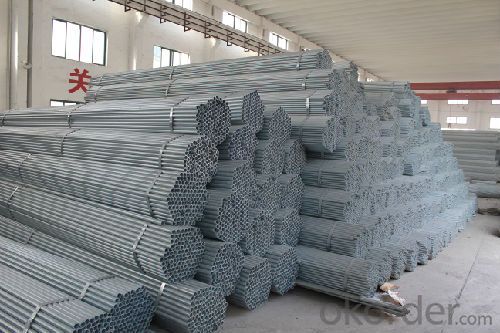
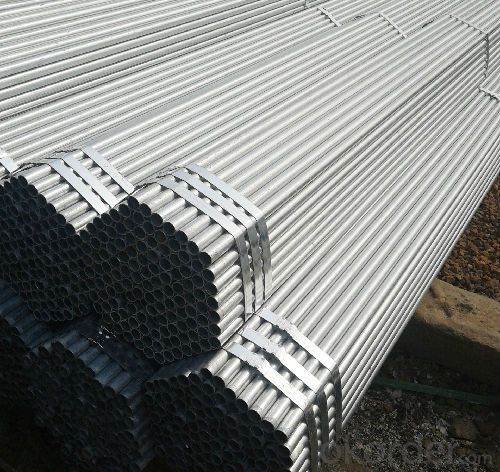
- Q: How are steel pipes protected against underground corrosion?
- Steel pipes are protected against underground corrosion through a process called cathodic protection. This involves the use of sacrificial anodes or impressed current systems, which help to create a protective electrical current that prevents the steel from corroding. Additionally, coatings and wraps are applied to the pipes to provide an additional layer of protection against corrosion.
- Q: How are steel pipes used in the automotive industry?
- Steel pipes are commonly used in the automotive industry for various applications such as exhaust systems, fuel lines, and structural components. They provide strength, durability, and resistance to corrosion, making them ideal for withstanding high temperatures and harsh conditions. Steel pipes are essential in ensuring efficient exhaust gas flow, delivering fuel to the engine, and providing structural support to enhance vehicle safety and performance.
- Q: What are the factors affecting the cost of steel pipes?
- The factors affecting the cost of steel pipes include raw material prices, production and manufacturing costs, transportation and logistics expenses, market demand and supply dynamics, import and export tariffs, government regulations, and the overall economic conditions. Additionally, factors such as the grade and quality of steel used, diameter and thickness of the pipes, and any additional features or coatings can also influence the cost.
- Q: How are steel pipes tested for leakage?
- Steel pipes are tested for leakage using various methods, including hydrostatic testing, pneumatic testing, and ultrasonic testing. Hydrostatic testing involves filling the pipe with water or another liquid and subjecting it to high pressure to check for any leaks. Pneumatic testing, on the other hand, involves pressurizing the pipe with air or gas to detect any leakage. Ultrasonic testing utilizes sound waves to identify any defects or leaks in the pipe by measuring the time it takes for the sound waves to bounce back. These testing methods ensure that steel pipes meet the required standards and are free from any leakage.
- Q: What is the role of steel pipes in the transportation of liquefied natural gas (LNG)?
- Steel pipes play a crucial role in the transportation of liquefied natural gas (LNG) as they are used to create the necessary infrastructure for the safe and efficient transfer of LNG. These pipes are designed to withstand the extreme cold temperatures and high pressures associated with LNG, ensuring the integrity and reliability of the transportation system. They are used to construct LNG terminals, storage tanks, and pipelines, providing a secure conduit for the LNG to be transported from production sites to distribution centers or export facilities. Steel pipes are preferred due to their strength, durability, and ability to resist corrosion, making them essential for the smooth and reliable transport of LNG across long distances.
- Q: How are steel pipes used in the telecommunications sector?
- Steel pipes are commonly used in the telecommunications sector for various purposes. Firstly, steel pipes are used as conduit for underground cable installations. These pipes provide protection and support to the fiber optic cables that carry data and voice signals across long distances. The sturdy nature of steel pipes ensures that the cables remain safe from external factors such as moisture, rodents, and accidental damage. Additionally, steel pipes are used in the construction of telecommunication towers and masts. These structures require a strong and durable material to support the weight of antennas, transmitters, and other equipment. Steel pipes, with their high tensile strength and resistance to harsh weather conditions, are ideal for this purpose. Moreover, steel pipes are used for the installation of overhead communication lines. These lines are often suspended between poles or towers, and steel pipes are used as supports or brackets to hold the cables in place. The corrosion-resistant properties of steel make it a reliable choice for outdoor installations that are exposed to the elements. In summary, steel pipes play a crucial role in the telecommunications sector by providing protection, support, and durability to cable installations, tower constructions, and overhead communication lines. Their strength and resistance to environmental factors make them an essential component in building and maintaining reliable telecommunications networks.
- Q: What is the importance of corrosion resistance in steel pipes?
- The importance of corrosion resistance in steel pipes is significant as it helps to extend the lifespan of the pipes, ensures their structural integrity, and maintains the quality of the fluid or gas being transported. Corrosion can lead to pipe failures, leaks, and contamination of the contents, resulting in costly repairs, environmental hazards, and potential safety risks. Therefore, incorporating corrosion-resistant properties in steel pipes is crucial for their long-term performance, durability, and overall efficiency.
- Q: How are steel pipes used in nuclear power plants?
- Steel pipes are extensively used in nuclear power plants for various purposes. They are primarily used for the transportation of coolant, such as water or gas, which helps in removing heat from the reactor core. Steel pipes are also used to convey steam generated by the reactor to the turbine, where it is used to generate electricity. Additionally, steel pipes are utilized for the transportation of various fluids, such as lubricants and chemicals, for different processes within the plant. The durability, strength, and resistance to high temperatures and pressure make steel pipes an ideal choice for these critical applications in nuclear power plants.
- Q: What is the maximum pressure that steel pipes can handle?
- The maximum pressure that steel pipes can handle varies depending on factors such as the specific grade of steel, diameter, and wall thickness of the pipe. However, steel pipes are known for their high strength and durability, and they can typically handle pressures ranging from a few hundred to several thousand pounds per square inch (psi).
- Q: What are the different methods of joining steel pipes for oil and gas pipelines?
- There are several methods of joining steel pipes for oil and gas pipelines, including welding, threading, and flange connections. Welding involves heating the ends of the pipes and fusing them together, creating a strong and seamless joint. Threading, on the other hand, involves cutting threads on the pipe ends and using threaded fittings to connect them. Flange connections use flanges and bolts to join the pipes together, allowing for easy disassembly and maintenance. Each method has its advantages and is chosen based on factors such as pipeline design, specifications, and project requirements.
Send your message to us
Pre-galvanized Pipe America Standard Q235 A500 150g Hot Dipped
- Loading Port:
- Tianjin
- Payment Terms:
- TT or LC
- Min Order Qty:
- 45 m.t.
- Supply Capability:
- 9000 m.t./month
OKorder Service Pledge
OKorder Financial Service
Similar products
Hot products
Hot Searches
Related keywords
